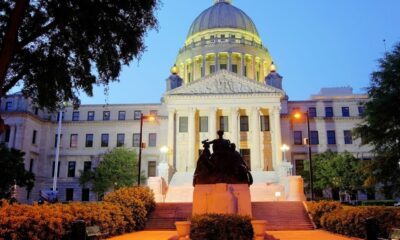Mississippi Today
Pastor urging lawmakers to expand Medicaid rushed to hospital after collapsing at Capitol
A minister collapsed at the Mississippi State Capitol on Wednesday while standing with fellow clergy members pleading with lawmakers to expand Medicaid coverage to some of the state's poorest residents.
The Rev. Darryl Magee, senior pastor at St. Thomas Missionary Baptist Church in Bolton, was carried away from the building by ambulance after experiencing a medical emergency. He was resuscitated by doctors at the Capitol and rushed to Baptist Medical Center, where he was awake and with family on early Wednesday afternoon.
The emergency halted a press conference, where about 50 clergy members from different denominations were advocating for Medicaid expansion. Dozens of people watched silently in the rotunda while doctors worked to save the pastor's life. Several bystanders hugged others or wiped tears from their faces, and many ministers prayed for Magee as he was being tended to.
Republican Lt. Gov. Delbert Hosemann, who holds enormous sway over the Medicaid expansion debate, was being addressed by those speaking at the press conference. After Magee collapsed, Hosemann watched from the third-floor railing while responders revived the pastor.

“Providing affordable health care for hard-working and vulnerable Mississippians is a matter of life and death,” Jason Coker, the president of the nonprofit Together for Hope, said shortly before Magee collapsed. “All the clergy here today are asking our government, the government of Mississippi, to choose life.”
The harrowing moment at the Capitol occurred as the Republican-controlled Senate considers legislation that overwhelmingly passed the Republican-controlled House in February to expand Medicaid coverage to the working poor. Senate Medicaid Chairman Kevin Blackwell, a Republican from Southaven, is expected to release a separate expansion proposal in the coming days.
As Easter Sunday approaches, Bishop Ronnie Crudup Sr., the senior pastor of New Horizon Church International in Jackson, urged lawmakers to remember that a key lesson from the religious holiday was that Jesus sacrificed himself to benefit other people.
He specifically asked the 52-member Senate to set partisanship aside and approach Medicaid expansion, a policy some conservative Republicans oppose, in the same manner.
“I call upon the Senate to inconvenience itself, to be willing to make a sacrifice, so that those that are lacking in this state can get their due share,” Crudup said. “So their families can be stronger and the state of Mississippi will be better because those folks are healthier.”

Mississippi only offers Medicaid to families who make up to 28% of the federal poverty level – the federal minimum. However, thousands of Mississippians make more money than 28% of the poverty level, but don't make enough money to afford health insurance.
Experts estimate that 123,000 uninsured Mississippians would gain coverage under the expansion plan that passed the House. That number includes the 74,000 people under the poverty level and an additional 49,000 uninsured adults whose income is between 100% and 138% of the federal poverty level.
“I know log truck drivers that this bill could help,” Heath Ferguson, the lead chaplain for Mississippi's Baptist Health System, said during the press conference on Wednesday. “I know small-town folks that this could help. I know that those who work from barber shops to our tire shops who need this help. And I also know lots of small-church pastors that need this help tremendously.”
As emergency responders worked to save Magee's life, the group of clergy joined hands with others gathered at the Capitol for a prayer circle.
“I pray now, God, for a favorable outcome for Pastor Magee,” state Sen. Gary Brumfield, D-McComb, prayed. “We pray that you would move in this situation … We pray, too, God, that you would move in this Senate, that you will meet the needs that people are crying out for in our state.”

This article first appeared on Mississippi Today and is republished here under a Creative Commons license.
Mississippi Today
On this day in 1961
MAY 20, 1961

A white mob of more than 300, including Klansmen, attacked Freedom Riders at the Greyhound Bus Station in Montgomery, Alabama. Future Congressman John Lewis was among them.
“An angry mob came out of nowhere, hundreds of people, with bricks and balls, chains,” Lewis recalled.
After beating on the riders, the mob turned on reporters and then Justice Department official John Seigenthaler, who was beaten unconscious and left in the street after helping two riders.
“Then they turned on my colleagues and started beating us and beat us so severely, we were left bloodied and unconscious in the streets of Montgomery,” Lewis recalled.
As the mob headed his way, Freedom Rider James Zwerg said he asked for God to be with him, and “I felt absolutely surrounded by love. I knew that whether I lived or died, I was going to be OK.”
The mob beat him so badly that his suit was soaked in blood.
“There was nothing particularly heroic in what I did,” he said. “If you want to talk about heroism, consider the Black man who probably saved my life. This man in coveralls, just off of work, happened to walk by as my beating was going on and said ‘Stop beating that kid. If you want to beat someone, beat me.' And they did. He was still unconscious when I left the hospital.”
To quell the violence, Attorney General Robert Kennedy sent in 450 federal marshals.
This article first appeared on Mississippi Today and is republished here under a Creative Commons license.
Mississippi Today
Podcast: The controversial day that Robert Kennedy came to the University of Mississippi
Retired U.S. Bankruptcy Judge Edward Ellington talks with Mississippi Today's Bobby Harrison and Geoff Pender about former U.S. Attorney General Robert Kennedy's speech at the University of Mississippi less than four years after the riots that occurred after the integration of the school. Ellington, who at the time headed the Ole Miss Speaker's Bureau as a law school student, recalls the controversy leading up to the speech.
This article first appeared on Mississippi Today and is republished here under a Creative Commons license.
Mississippi Today
2024 Mississippi legislative session not good for private school voucher supporters
Despite a recent Mississippi Supreme Court ruling allowing $10 million in public money to be spent on private schools, 2024 has not been a good year for those supporting school vouchers.
School-choice supporters were hopeful during the 2024 legislative session, with new House Speaker Jason White at times indicating support for vouchers.
But the Legislature, which recently completed its session, did not pass any new voucher bills. In fact, it placed tighter restrictions on some of the limited laws the state has in place allowing public money to be spent on private schools.
Notably, the Legislature passed a bill that provides significantly more oversight of a program that provides a limited number of scholarships or vouchers for special-needs children to attend private schools.
Going forward, thanks to the new law, to receive the vouchers a parent must certify that their child will be attending a private school that offers the special needs educational services that will help the child. And the school must report information on the academic progress of the child receiving the funds.
Also, efforts to expand another state program that provides tax credits for the benefit of private schools was defeated. Legislation that would have expanded the tax credits offered by the Children's Promise Act from $8 million a year to $24 million to benefit private schools was defeated. Private schools are supposed to educate low income students and students with special needs to receive the benefit of the tax credits. The legislation expanding the Children's Promise Act was defeated after it was reported that no state agency knew how many students who fit into the categories of poverty and other specific needs were being educated in the schools receiving funds through the tax credits.
Interestingly, the Legislature did not expand the Children's Promise Act but also did not place more oversight on the private schools receiving the tax credit funds.
The bright spot for those supporting vouchers was the early May state Supreme Court ruling. But, in reality, the Supreme Court ruling was not as good for supporters of vouchers as it might appear on the surface.
The Supreme Court did not say in the ruling whether school vouchers are constitutional. Instead, the state's highest court ruled that the group that brought the lawsuit – Parents for Public Schools – did not have standing to pursue the legal action.
The Supreme Court justices did not give any indication that they were ready to say they were going to ignore the Mississippi Constitution's plain language that prohibits public funds from being provided “to any school that at the time of receiving such appropriation is not conducted as a free school.”
In addition to finding Parents for Public Schools did not have standing to bring the lawsuit, the court said another key reason for its ruling was the fact that the funds the private schools were receiving were federal, not state funds. The public funds at the center of the lawsuit were federal COVID-19 relief dollars.
Right or wrong, The court appeared to make a distinction between federal money and state general funds. And in reality, the circumstances are unique in that seldom does the state receive federal money with so few strings attached that it can be awarded to private schools.
The majority opinion written by Northern District Supreme Justice Robert Chamberlin and joined by six justices states, “These specific federal funds were never earmarked by either the federal government or the state for educational purposes, have not been commingled with state education funds, are not for educational purposes and therefore cannot be said to have harmed PPS (Parents for Public Schools) by taking finite government educational funding away from public schools.”
And Southern District Supreme Court Justice Dawn Beam, who joined the majority opinion, wrote separately “ to reiterate that we are not ruling on state funds but American Rescue Plan Act (ARPA) funds … The ARPA funds were given to the state to be used in four possible ways, three of which were directly related to the COVID -19 health emergency and one of which was to make necessary investments in water, sewer or broadband infrastructure.”
Granted, many public school advocates lamented the decision, pointing out that federal funds are indeed public or taxpayer money and those federal funds could have been used to help struggling public schools.
Two justices – James Kitchens and Leslie King, both of the Central District, agreed with that argument.
But, importantly, a decidedly conservative-leaning Mississippi Supreme Court stopped far short – at least for the time being – of circumventing state constitutional language that plainly states that public funds are not to go to private schools.
And a decidedly conservative Mississippi Legislature chose not to expand voucher programs during the 2024 session.
This article first appeared on Mississippi Today and is republished here under a Creative Commons license.
-
Our Mississippi Home7 days ago
Beat the Heat with Mississippi’s Best Waterparks
-
SuperTalk FM4 days ago
State auditor cracking down on Mississippians receiving unemployment benefits
-
Mississippi News Video6 days ago
Jackson has a gang problem
-
Local News3 days ago
Family files lawsuit after teen’s suicide in Harrison County Jail
-
Kaiser Health News7 days ago
Medicaid ‘Unwinding’ Decried as Biased Against Disabled People
-
Mississippi Today5 days ago
On this day in 1950
-
228Sports6 days ago
George County Pours Runs In 6A South State Title Victory At PRC
-
Local News Video6 days ago
In the Kitchen with J's Restaurant








































